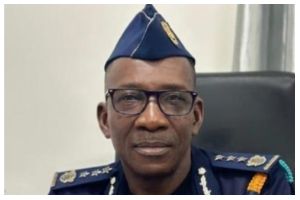By Kwame Okoampa-Ahoofe, Jr., Ph.D.
Two weeks after the fact, many quite prominent Americans – writers and intellectuals – continue to weigh in on the Gates-Crowley Affair. The latest of one such major contributor is Mr. Bob Herbert, columnist for the celebrated New York Times. In an article captioned “Anger Has Its Place,” Mr. Herbert appears to firmly believe that due to their long and harrowing experience with America’s culture of racial bias, vis-à-vis the treatment of ethnic and racial minorities by mainstream white society, African-Americans have an unfettered and inviolable right to be angry and loudly confrontational with all law-enforcement agents with whom they come into contact:
“You can yell at a [white] cop in America. This is not Iran. And if some people don’t like what you’re saying, too bad. You can even be wrong in what you are saying. There is no law against that. It is not an offense for which you are supposed to be arrested” (New York Times 8/1/09).
Exactly why Mr. Herbert supposes that Iranians deserve any worse treatment at the hands of their cops but Americans, especially those of African descent, somehow, deserve a better treatment is not clear, though the implicit import of the above statement is unmistakable. And this precisely is the problem with writers and social critics of Mr. Herbert’s ilk and bent. For the latter, the very fact of one’s not holding an American citizenship, or passport, as well as living outside the geopolitical confines of the United States of America, automatically renders one fair game for any kind of abject treatment. The civilized and meticulous practice of human rights and the rule of law and order, to such critics, are the especial preserve of Americans, no ifs and buts. And if they are generous enough, then they are apt to charitably designate an increasingly amorphous geopolitical entity called “The West” as integral to the equation.
What is also interesting about the cognitive temperament of the veteran New York Times columnist, and a former editor of the New York Daily News, is the apparently flat and adamant refusal of Mr. Herbert to take account of the fact that a certain decibel level of “yelling and screaming” at police officers busily and dutifully engaged in their official duties could actually disrupt the purposes for which these police officers were hired, or employed, by the community or the state.
Then also, the critic seems to curiously believe that the deliberate verbal or behavioral abuse of law-enforcement officials, such as Harvard professor Henry Louis Gates, Jr., is alleged to have indulged, is perfectly sound.
The problem with the foregoing observation is further complicated when the New York Times columnist, who also claims to be friends with Prof. Gates and appears to have written from Cambridge, Mass., where he is scheduled to receive an award from the Gates-run W. E. B. Institute for African and African-American Research, describes the Keyser, West Virginia, native as both a “distinguished” Harvard professor and a “leader” of President Obama’s ilk:
“The message that has gone out to the public is that powerful African-American leaders like Mr. Gates and President Obama will be very publicly slapped down for speaking up and speaking out about police misbehavior, and that the proper response if you think you are being unfairly targeted by the police because of your race is to chill.”
First of all, one cannot take Mr. Herbert seriously regarding his description of Prof. Gates as a “leader” of President Obama’s ilk or caliber, the latter’s public profession of friendship notwithstanding; for not only has nobody within the African-American community elected Prof. Gates to serve in any recognizable public capacity, the Harvard educator has always publicly envisaged himself as a writer, literary critic and a professor and nothing more or less. Neither has Prof. Gates been known for any remarkable communal activism for more than a decade, if at all. And to be certain, until he started making filmic documentaries some 10 years ago, the narrator of “Black American Lives” was arguably the most remote, or least accessible, of the leading African-American intellectuals.
One cannot, for instance, comfortably match Prof. Gates’ community leadership credentials with those of Princeton scholar Dr. Cornel West, who has over nearly three decades forged a palpable, impeccable and genuinely organic relationship with the African-American community cross-generationally. Indeed, what many of us have also been silent about is the fact that Dr. West’s Hip-Hop gregariousness acutely belies his formidable intellectual prowess or genius.
In other words, what has not been properly recognized by both their admirers and critics is the fact that Cornel West is a “Thinker” in a way that Henry Louis Gates, Jr., could never be realistically envisaged or fathomed. And this observation is not facilely predicated on the fact of Dr. West’s training as a philosopher of the foremost order.
Couple the foregoing with his trademark humility and cognitive gravitas, and one immediately begins to wonder whether we would be having this patently extraneous debate on law enforcement and race in America, had Sgt. Crowley been called to Prof. West’s residence at Princeton, rather than that of Prof. Gates’ at Harvard. And here, too, we must quickly add the fact that Prof. West, a Harvard alumnus and a magna-cum-laude graduate in Philosophy and Religion, used to work with Prof. Gates at Harvard.
What also becomes disturbingly obvious, reading Mr. Herbert’s article, is that “friendship,” rather than sheer racism, may yet be the greatest impediment to both critical thinking and fairness. Thus, shortly before he exuberantly acknowledges that “Mr. Gates is a friend, and I was selected some months ago to receive an award from an institute that he runs at Harvard,” Mr. Herbert is also able to brazenly assert, without any qualms, whatsoever, that: “If Professor Gates ranted and raved at the cop who entered his home uninvited with a badge, a gun and an attitude, he didn’t rant and rave for long. The 911 call came in at about 12:45 on [sic] the afternoon of July 16 and, as The Times has reported, Mr. Gates was arrested, cuffed and about to be led off to jail by 12:51.”
Exactly how the critic is able to conclude that Sgt. Crowley entered Prof. Gates’ residence with “an attitude,” even while also acknowledging that he did not even make such basic journalistic effort of either contacting or “speaking” to Prof. Gates “while [supposedly] researching this column,” makes you wonder just what does Mr. Herbert mean by his use of the term “researching.” One thing, however, is clear: Mr. Herbert is an impudent liar. And we know this because the black New York Times columnist claims that Sgt. Crowley entered the renowned Harvard professor’s home “uninvited,” when in reality, Officer Crowley was promptly responding to an emergency call made to his precinct regarding the possibility of an ongoing burglary. What is even more than pathetic, here, is the fact that Mr. Herbert deliberately and conveniently ignores the fact that the emergency (or 9-1-1) call to the Cambridge police emanated from a passerby’s having observed Prof. Gates, accompanied by his driver, attempt to jimmy his way into his own house.
Obviously, the recipient of the Gatesian Award (for whatever it is worth) craftily ignores the preceding fact because it glaringly impugns the credibility of Mr. Herbert’s attempt to callously cast Sgt. Crowley in the traditional stereotypical mold of a “Bad-Assed Racist White Cop.”
Mr. Herbert also does a great disservice to both himself and the continuously evolving history of race relations in America, particularly when he cynically sneers that: “This country [read: white America] is not interested” in pursuing a sustained and meaningful dialogue on race. And as I pointed out to Mr. Herbert in my unpublished comment to his web log on the website of the New York Times, “America just had a very ‘serious conversation on race’ last November when then-candidate Obama, running against a barb-tongued and presumptuous conservative white opponent, was elected President by a white electoral majority in a landmark landslide.” Even so, what we are even more concerned with here is the fact of Mr. Herbert’s description of Prof. Gates as “an African-American leader,” while also seeming to imply that being recognized as an African-American leader entails no social responsibility, either to oneself or society at large, whatsoever. Then also, the critic woefully fails to recognize the fact that being widely, or nationally, recognized as “a distinguished professor” implies that even confronted in a personally difficult, or irritating, situation, Prof. Gates had been expected to have deported/comported himself well above board, as it were.
Alas, in Mr. Herbert’s article, we find a clinical nihilist who insists, quixotically, on eating his proverbial cake and having it at the same time.
*Kwame Okoampa-Ahoofe,Jr., Ph.D., is Associate Professor of English, Journalism and Creative Writing at Nassau Community College of the State University of New York, Garden City. He is also a Board Member of the Accra-based Danquah Institute (DI), a pro-democracy think-tank, and the author of 20 books, including “The New Scapegoats: Colored-on-Black Racism” (iUniverse.com, 2005). E-mail: okoampaahoofe@aol.com. ###
Diaspora News of Sunday, 2 August 2009
Source: Okoampa-Ahoofe, Kwame
Pass the Beer, Mr. President! (Part 2)
Entertainment











